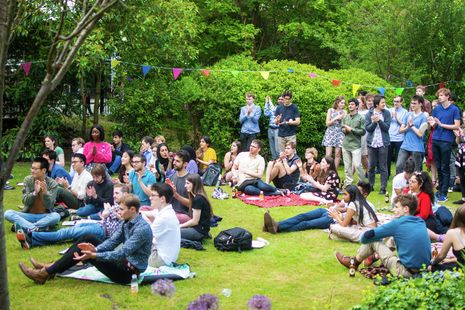(Re)Thinking Charity: The May Week Alternative
Joe offers a fresh perspective on how we can think about giving to charity as students, through the lens of the May Week Alternative.

Can you remember the last time you did something for charity? Maybe you attended a fundraising event, or bought something at a bake sale, or put some loose change in a bucket collection – or maybe you can’t remember. In any case, the chances are you didn’t think too much about it; you parted with the money lightly, perhaps feeling that you got something worthwhile in return.
To be clear, this is not to say you weren’t generous, or that these campaigns are not worthwhile – quite the opposite. But this philosophy, which seems to be the current default for charitable fundraising, places fundamental limits on what we can achieve.
The thinking goes that most people won’t make time to think about charity in their daily lives, or simply don’t feel motivated to independently give. So, the way to attract donations is either to offer something in return, so that donors can let themselves be convinced they’re making a transaction rather than a sacrifice. Or, you make giving effortless and imperceptible – for example, by rounding up your purchase to the nearest pound.
“This active and positive approach to giving represents a radical shift in the current fundraising narrative.”
These methods do work, but only to an extent. By their very nature, they can only raise as much as we can give without thinking. As such, they fundamentally target small change, often removing the emphasis from the act of giving rather than encouraging donors to think about where their money is actually going.
However, there is a different way to think about charity. As May Week Alternative (MWA) has shown, it’s possible to persuade people – students no less – to donate substantial amounts to charity, and to do so directly, without trying to disguise it, whilst offering nothing of similar value in return. The key is in the framing.
At Cambridge, we are lucky enough to have a widely-renowned tradition of celebration at the end of the year; MWA aims to harness this tradition to encourage students to engage consciously with charity, turning giving into an integral part of their celebrations. It does this by inviting students to donate approximately the cost of a May Ball ticket to charity, with all donations doubled through matched funding. They then host a summer party during May Week to celebrate the collective impact.
The recommended donation is £150 to the Against Malaria Foundation, but because this is a significant amount, financially infeasible for some, donations of all sizes are welcome. The thing MWA places emphasis on is that people are making a considered and deliberate donation that is meaningful to them.
The idea is that, by celebrating through giving and putting charity at the heart of their May Week celebrations, students can positively engage with donating a significant amount of money (and having a correspondingly significant impact). This active and positive approach to giving represents a radical shift in the current fundraising narrative.
By its very definition, joining MWA is not something you can do without thinking; to donate such a significant amount of money is not easy, especially when, as it will be for the vast majority of students, it’s several times what you’ve ever donated in the past. You can’t do it without reflecting on the potential impact of such a donation – that is, 350 people protected from a life-threatening disease – and consciously deciding that it’s something you want to be a part of.
And so, students have joined, and not just a few. In less than two years, over 250 people have chosen to join MWA, with more joining the growing community each week. Together they’ve raised £67,000 – enough to protect over 79,000 people from malaria.
Beyond that, this philosophy has given hundreds of students the chance to engage with giving to charity in a completely new way. Time and again, as students join MWA, I see people go from struggling to relate to charity, or viewing it as a moral burden, to appreciating the massive positive impact it is possible to have through our choices, and gaining a fresh and empowering attitude towards giving.
That so many people would choose to make such a significant contribution continues to humble me. But the success of MWA has also been beyond anything I could have originally predicted. It has forced me to ask: what is it about the message that has meant that students of all backgrounds have been happy to donate so much more than you’d expect?
I believe that this surprising success can be attributed to the positive approach to giving. To go from viewing charity as a moral duty, something to be tricked into, or something to ignore to seeing it as a considered, deliberate and positive act can be incredibly refreshing. Put simply, it is so much easier to act when we are inspired rather than obligated by the change we want to see. All that takes is a simple change in perspective, but the consequences can be enormous, enabling hundreds of students to make a profound difference on a previously unimaginable scale.
 News / Eight Cambridge researchers awarded €17m in ERC research grants27 December 2025
News / Eight Cambridge researchers awarded €17m in ERC research grants27 December 2025 News / Downing investigates ‘mysterious’ underground burial vault 29 December 2025
News / Downing investigates ‘mysterious’ underground burial vault 29 December 2025 Lifestyle / Ask Auntie Alice29 December 2025
Lifestyle / Ask Auntie Alice29 December 2025 Sport / Hard work, heartbreak and hope: international gymnast Maddie Marshall’s journey 29 December 2025
Sport / Hard work, heartbreak and hope: international gymnast Maddie Marshall’s journey 29 December 2025 Interviews / Meet Juan Michel, Cambridge’s multilingual musician29 December 2025
Interviews / Meet Juan Michel, Cambridge’s multilingual musician29 December 2025










